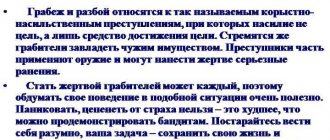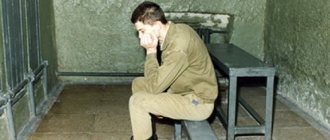Commentary to Art. 30 of the Criminal Code of the Russian Federation
Commentary edited by Esakova G.A.
1. When qualifying preparation, it should be borne in mind that in this case the actions that constitute the preparation are not included in the objective aspect of the crime being prepared.
Instruments for committing a crime should be understood as objects directly used in the process of committing a crime, increasing the physical capabilities of a person. The means of committing a crime are objects, substances, energy and devices, the physical, chemical and other properties of which are used to commit a crime.
Purchasing should be understood as acquisition, regardless of the method, means or instruments of committing the crime. This can be a purchase, exchange, acquisition for temporary use, theft, etc. Manufacturing differs from mining in that the means and instruments necessary to commit a crime are created anew. Adaptation of means and instruments for committing a crime involves their conversion from objects already at the disposal of the perpetrator.
Finding accomplices means inducing third parties to commit a crime or recruiting them. If a person, due to circumstances beyond his control, failed to persuade other persons to commit a crime, then he is responsible for failed incitement, qualified as preparation for a crime (Part 5 of Article 34 of the Criminal Code).
Conspiracy means the creation of a group of persons, a group of persons by prior conspiracy or an organized group to commit a crime.
Other intentional creation of conditions for the commission of a crime means the removal of obstacles, study of the location of the alleged crime, and other activities aimed at ensuring the opportunity to commit a crime.
2. When qualifying preparation, it is necessary to distinguish it from the detection of intent, which has no criminal legal significance. In this case, the mere expression of intention, not supported by specific actions, cannot entail criminal liability.
3. An attempt differs from preparation in that it is an attack on an object protected by criminal law, and the actions during the attempt are included in the objective side of the crime being committed. The objective side of an attempt is characterized by three features: a) the action (inaction) is directly aimed at committing (executing) a crime; b) the commission (execution) of the crime is interrupted; c) the commission (execution) of a crime was interrupted due to circumstances beyond the control of the perpetrator.
4. In judicial practice, an unsuitable attempt is also distinguished: an attempt on an unsuitable object and an attempt with unsuitable means. An attempt on an unfit object is characterized by the fact that the real object, to which harm is intended, is not put in danger at all (for example, an attempt to “kill” a corpse or steal drugs mistakenly believed to be narcotic). An attempt with unsuitable means is an attempt to commit a crime with the help of such means and instruments that objectively in this particular case cannot cause harm (a factual error in the means of committing the crime). Both types of inappropriate attempt must be qualified as an attempt on the crime that the perpetrator intended to commit.
Responsibility for violation
In an attempt, the criminal has a motive - to break the law, accordingly, he already carries a certain danger, taking this into account, the legislator holds people who tried to violate the established order to real responsibility. In the Criminal Code of the Russian Federation, Chapter 6 describes all aspects of this crime and provides for punishment for it. The nuances of unfinished crimes are described in detail in Articles 29, 30 and 31 of the Criminal Code. When determining punishment, it is very important to prove direct intent, because without it a person will not be held accountable.
Article 30 of the Criminal Code itself does not imply specific sanctions, but the legislator imposes a sanction of no less than ¾ of the maximum penalty for the full crime.
For example, if a person has committed attempted murder and the fact of his actions is proven, he will be punished with 11 years in prison. According to Art. 105 (murder), the maximum prison term is 15 years, and taking into account the attempt, 3/4 of 15 = 11 years is the maximum possible punishment. When determining the size, mitigating circumstances and, of course, aggravating circumstances may be taken into account. If the offender had minor children, he may be given 9 years instead of 11.
Necessary clarifications
In order to better understand specific situations related to unfinished crimes, it is necessary to carefully study Art. 30 of the Criminal Code of the Russian Federation with comments. These explanations provide a detailed description of each of the concepts used. For example, what is meant by an unfinished crime? This does not mean at all that the person who tried to commit it suddenly changed his mind on his own initiative (due to fear, pity or indecision). Not at all.
It’s just that objective circumstances have developed in such a way that certain obstacles have arisen to completing the criminal actions that have begun. For example, it was raining heavily or there were strangers nearby whose presence did not allow us to continue what we had planned. In addition, the comments describe four types of assassination attempts:
- Unfinished. The subject did not have the opportunity to complete the initiated actions, so they did not lead to a harmful result (for example, the citizen took aim, but did not shoot because he was detained).
- Finished, when the action was objectively carried out, but the expected consequences, dangerous for society, never occurred (the offender shot and missed).
- An assassination attempt committed with inappropriate means. That is, they, in fact, cannot harm anyone.
- An attempt that was made on an unusable object. The subject of the crime has lost its properties or is completely absent.
Reading such explanations makes the essence of this article clearer.
Comments on Article 30
Cooking is characterized by objective and subjective signs.
Article 30 in the Criminal Code of the Russian Federation with comments:
- Objective signs – the crime was not completed.
- Subjective signs: deliberate nature.
- Creation of conditions is possible through active actions. The list in Part 1 is not exhaustive. This is the search for funds and tools (legal, illegal acquisition, discovery, theft), making tools (Finnish knife, key), adapting tools (repairing, turning a gun into a sawn-off shotgun).
- Objective signs – search for accomplices, recruitment. Other creation of conditions lies beyond the specified list, this includes site research, development of a plan, search for a place to store the received property.
Preparation for a crime - performing all the actions. This means that it is not carried out for subjective reasons (fear of arrest, pity), but for objective reasons. The signs lie outside the scope of the act; it has not yet begun to be carried out. In cases of increased danger of actions, the legislator recognizes them as a variant of the manifestation of the objective side of the act.
Cooking is a deliberate fault. Part 2 states that criminals who are preparing to commit serious or especially serious crimes are subject to criminal punishment. For example, counterfeiting securities is classified as preparation for fraud, while counterfeiting a lottery ticket is for sale.
Attempted crime - actions or inactions aimed at committing a crime. The law specifies the possibility of assassination by actions or inactions. Objective signs: focus on committing an act, it is not completed.
Responsibility comes for preparing for serious crimes. Actions are aimed at committing a crime. This means that the object is already beginning to change. Robbery in Article 161 is described as a material element; to be considered an attempt, it is necessary to seize property without recourse to one’s own benefit. If a person has committed a theft and is detained with property until they have the opportunity to dispose of it, then this is an attempted theft.
When transferring drugs against the background of a test purchase, the deed constitutes an attempt, since the substance is withdrawn from circulation. Actions against the victim committed within a period of time, with the same goals and motives, are qualified as an attempt. The possibility of an assassination attempt with a formal composition is limited by conditions: it is possible when the objective side is added, when there is a time gap between the beginning of actions and their end.
The circumstances are varied. For example, an attempt to create a gang is an action to create a stable group, stopped by the police.
When giving a bribe or transferring illegal remuneration during bribery, liability is imposed under Article 204 or 291 if the official refused the money. It is not an attempt to commit a crime if a person expresses his intention to receive a bribe if he has not taken any action. The subjective side is an intentional crime. The perpetrator understands the danger of actions, wants to carry them out further, or sees the danger of actions and the onset of consequences, desires them. For example, attempted murder always has direct intent.
Determining intent is necessary to distinguish an attempt from a crime or other attempts. For example, attempted rape is recognized as such if the person acts for the purpose of sexual intercourse, and violence is a means to achieve the goal. These 2 factors establish the presence of attempted rape and distinguish attempted rape from violent sexual acts.
In the practice of criminal law, several types of attempts are considered: on an unsuitable object or with unsuitable means. A mistake is an attempt on an unusable object, when, due to the special properties of the object, the actions of the culprit do not encroach on the object and cannot cause harm (replacing the poison with another powder, shooting at a mannequin and not at a person).
The peculiarity of the attempt is that it was not completed due to a mistake. The person uses weapons that cannot achieve the goal (shooting from a starting pistol that the person considers to be a combat pistol). An attempt is also divided into completed and unfinished. They are differentiated by the degree of implementation of intentions. When completed, the person does everything in his power, but the result does not occur due to circumstances beyond his control (miss when shooting). A completed attempt is close to a completed crime and entails punishment.
If unfinished, the person did everything he considered necessary to obtain the result, but it was not achieved (swinging a knife, but there was an obstacle on the part of the victim). With such an attempt there is no possibility of causing harm. Such attempts do not affect qualifications.
Minimizing liability
Very often, lawyers seek an acquittal for people who have committed an unfinished crime, on the basis of Article 31 of the Criminal Code of the Russian Federation. Using a clear example, the method of minimizing punishment can be explained by a situation in which citizen Petrov entered the apartment of his partner with a knife and wanted to kill her. The fact of his direct intent was proven. At the trial, he stated that he initially wanted to kill his victim, but upon entering the apartment he changed his intentions, because he smelled the familiar smell of the woman’s cooking, saw such a familiar appearance and decided to talk to the lady. According to law enforcement officials, the culprit did not complete his plan due to an attack by a dog, which was set on by a woman who saw her ex-husband.
The culprit himself denies that the intent to kill remained with him until he was detained by the police; no one can prove the opposite. Objectively, the woman was not injured, because he did not stab her, the only indicator is the objective side, because he entered the victim’s house. In this situation, the person will be charged with illegal entry, but he will not be punished for the attempt, even if in fact he still wanted the death of his ex-wife.
The criminal legislation in our country is still too imperfect and often criminals manage to avoid deserved punishment, which only pushes them to further criminal activity and increases their sense of impunity.
Article 30
2. We can talk about preparation as a stage of committing a crime only when a person is preparing to commit a specific crime, with the intention of subsequently bringing his criminal intent to completion. Because of this, it is impossible to consider as preparation cases when a person intends to commit any crime at all and performs preparatory actions (for example, makes a knife “just in case,” based on the fact that it “might come in handy”). However, some of the mentioned actions can be socially dangerous and form an independent crime (Articles 223, 324 of the Criminal Code, etc.).
The difference between an attempt and preparation for a crime
Preparation and attempt are closely related concepts and sometimes cause certain difficulties in law enforcement practice. The main distinguishing characteristics of the preparation stage from an assassination attempt are:
- Preparation only creates the conditions necessary and sufficient, in the opinion of the criminal, to achieve a criminal result.
- The attempt is the very cause of the criminal result.
- An attempt at a criminal act is not always the stage following preparation, while preparation does not always precede an attempt.
Verdict h
After which Ryzhkov V.S., continuing to implement his criminal intent, aimed at stealing funds FULL NAME20 by deception, causing significant damage, acting deliberately, for selfish reasons, realizing the social danger of his actions, foreseeing the inevitability of socially dangerous consequences in the form of causing significant material damage and wanting this, again distorting the voice, deliberately changing the tone of the conversation so that FULL NAME20 gets the impression that another person is entering the conversation, introduced himself to the latter as a law enforcement officer with pre-fictitious data, confirming the deliberately false information he had previously reported about what her son had committed crime, as a result of which a person suffered, under the pretext of providing assistance to her son in order to avoid criminal liability and help the victim, he began to ask FULL NAME20 to pay money in the amount of 50,000 rubles, transferring it through a terminal for paying for cellular communications to a subscriber number that was not identified during the investigation.








